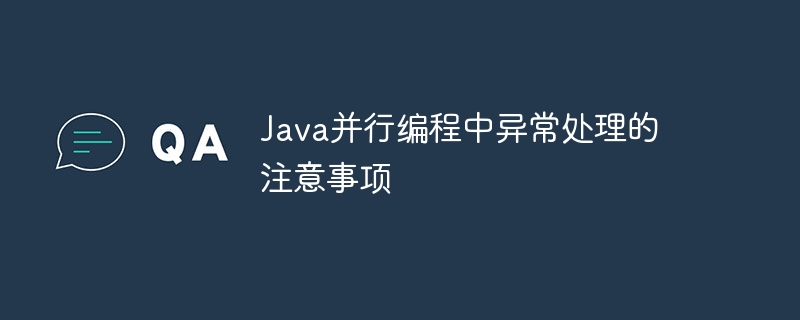
In parallel programming, exception handling considerations include: using thread-safe exception handlers to avoid deadlocks and data corruption. Avoid blocking in the finally block to prevent other threads from deadlocking due to insufficient resources. Catch and propagate exceptions to avoid application crashes or data corruption. Use atomic operations to read and write shared variables to ensure data integrity.

Notes on exception handling in Java parallel programming
In parallel programming, exception handling is crucial because it has Helps applications recover from unforeseen errors, ensuring reliability and availability. Handling exceptions in parallel programs requires special considerations to avoid problems such as deadlocks and data corruption.
1. Use thread-safe exception handlers
Exception handlers should be thread-safe, meaning they can be safely retrieved from multiple threads Visit simultaneously. Non-thread-safe exception handlers can cause deadlocks or data corruption because multiple threads may try to access shared resources simultaneously.
2. Avoid blocking in the finally block
The finally block is always executed regardless of whether an exception occurs. Blocking operations (such as I/O operations, thread waits, etc.) in the finally block may cause other threads to deadlock due to insufficient resources.
3. Catch and propagate exceptions
In parallel programs, exceptions will propagate from one thread to another, so it is very important to catch and propagate exceptions. If exceptions are not handled, it can cause application crashes or data corruption.
4. Use atomic operations
In a multi-threaded environment, when reading and writing shared variables, atomic operations should be used to ensure data integrity. Atomic operations ensure that modifications to shared variables are atomic, that is, performed in one operation and will not be interrupted by other threads.
Example:
Consider the following example that demonstrates best practices for exception handling:
import java.util.concurrent.ExecutorService;
import java.util.concurrent.Executors;
public class ParallelExceptionHandler {
public static void main(String[] args) {
ExecutorService executorService = Executors.newFixedThreadPool(2);
try {
executorService.submit(() -> {
try {
// 线程任务
} catch (Exception e) {
// 捕获异常并传播到主线程
e.printStackTrace();
throw e;
}
});
} catch (Exception e) {
// 处理主线程中的异常,关闭线程池
executorService.shutdown();
} finally {
// 确保线程池关闭,避免其他任务因异常而阻塞
executorService.shutdownNow();
}
}
}In this example, the exception is in a child thread is caught and propagated to the main thread for proper processing. The executor shutdown is included in the finally block to ensure resources are released when an exception occurs.
Adhering to these precautions can help improve the reliability and robustness of parallel programs and reduce the possibility of deadlocks and data corruption.
The above is the detailed content of Things to note about exception handling in Java parallel programming. For more information, please follow other related articles on the PHP Chinese website!
 Introduction to the meaning of cloud download windows
Introduction to the meaning of cloud download windows
 DAT format file
DAT format file
 The main function of the arithmetic unit in a microcomputer is to perform
The main function of the arithmetic unit in a microcomputer is to perform
 How to download Razer mouse driver
How to download Razer mouse driver
 What is the difference between j2ee and springboot
What is the difference between j2ee and springboot
 How to find the median of an array in php
How to find the median of an array in php
 How to create html with webstorm
How to create html with webstorm
 float usage in css
float usage in css




